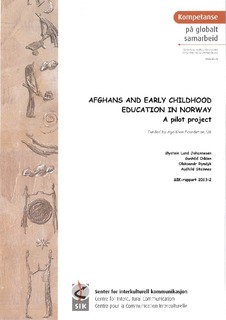| dc.contributor.author | Johannessen, Øystein Lund | |
| dc.contributor.author | Odden, Gunhild | |
| dc.contributor.author | Ryndyk, Oleksandr | |
| dc.contributor.author | Steinnes, Audhild | |
| dc.date.accessioned | 2019-08-16T08:04:30Z | |
| dc.date.available | 2019-08-16T08:04:30Z | |
| dc.date.issued | 2013 | |
| dc.identifier.uri | http://hdl.handle.net/11250/2608589 | |
| dc.description.abstract | In January 2010, 10 475 Afghans were officially living in Norway. The Afghans thus constitute the 18th largest immigrant community in Norway. The Afghan immigration being recent, a large majority of Norwegian-born Afghan children are in preschool age. In May 2011 Aga Khan Foundation in the UK (AKF) and Centre for Intercultural Communication (SIK) in Norway, agreed to work together to share and develop new knowledge and improve professional practice within the field of early childhood education, and in particular to focus on the encounter between early childhood education in Norway and Afghan parents and children. A pilot project was launched, with the aim of defining project goals, single out research questions and propose an appropriate methodological approach for a later main research and development project within this field. The main research questions for the pilot project were:
What are the experiences of the Afghan community and kindergarten personnel concerning Afghan children and early childhood education in Norway?
What kind of literature exists on the topic?
What are the main socio-demographic characteristics of the Afghans in Norway?
The encounter between kindergarten personnel and Afghan parents, language and mothertongue related issues and the situation of Afghan mothers on maternity leave emerged as the three themes to focus on when it comes to further work. Low proficiency in Norwegian as a second language among the Afghan parents combined with an inadequate access to interpreters and / or bilingual personnel was clearly regarded as an obstacle for good communication between kindergarten and the parents about the child’s wellbeing, learning and development. The pilot project also revealed low degree of kindergarten attendance by particularly the youngest Afghan children in the communities visited. These tendencies and findings should be further investigated in a future main project. | nb_NO |
| dc.language.iso | eng | nb_NO |
| dc.publisher | Misjonshøgskolens forlag | nb_NO |
| dc.relation.ispartofseries | SIK report;2013:2 | |
| dc.subject | refugees | nb_NO |
| dc.subject | afghanere | nb_NO |
| dc.subject | education | nb_NO |
| dc.subject | children | nb_NO |
| dc.subject | kindergarten | nb_NO |
| dc.subject | integration | nb_NO |
| dc.title | Afghans and early childhood education in Norway : a pilot project | nb_NO |
| dc.type | Report | nb_NO |
| dc.source.pagenumber | 116 s. | nb_NO |
| dc.relation.project | Funded by Aga-Khan Foundation, UK | nb_NO |
